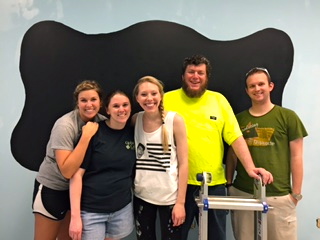Restored: Healing the Wounds of Domestic Sex Trafficking
Human sex trafficking. What images come to mind with these words? Perhaps run-down neighborhoods filled with shadowy, controlling men. Or perhaps various episodes of Law & Order: Special Victims Unit. Maybe you imagine the perpetrators and victims as other people in other countries. But these images of distant danger and criminals belie the prevalence of human sex trafficking in the United States. Most victims are much closer to home than we would care to imagine.
In fact, according to a study done by the Justice Department, 83% of victims of sex trafficking are citizens of the United States and the average age of introduction to the trade is only 13. To help provide these victims with an avenue away from such exploitation and back to restoration, Tracy McDaniel, Care Coordinator of the Human Trafficking Program at The Julian Center, founded a new nonprofit this year called Restored. Tracy says, “Restored provides direct services to victims of domestic sex trafficking and girls who have been sexually exploited between the ages of 11 and 24.” In 2016, Tracy is hoping to open a 24/7 residential care facility for these women to help them to recover, to gain independence, and to receive Restoration through Christ.
Tracy first felt the pull to begin a nonprofit focused specifically on helping young women who were victims of domestic sex trafficking through her work at The Julian Center. One day, a young woman she was assisting struck her with particular keenness. Tracy explains, “I really felt like in that moment I was able to see that brokenness and the fact that she just really needed someone to care for her. And really how important it was to build rapport and kind of be the hands and feet of Christ. God used her to really change me and [show me this] was really the calling He’d set forth for my life.” She shared her aspirations with various agency partners and people, including Joshua Abel, former Executive Director of the Legal Clinic. Through this connection, Tracy was able to rent office space from the Legal Clinic and make a home for Restored.
When it comes to the typical victim profile, Tracy says, “I think it’s important for people to know that trafficking doesn’t just happen in the urban city. It can happen in Carmel. It can happen in Fishers—that it can be a girl meets a boy at a party. It’s not ‘those’ kids. It can happen to anyone.” She says oftentimes traffickers will find girls through social media, targeting those who are vulnerable and simply seeking love and affirmation. Tracy says, “Most of the time they believe that this person is their boyfriend and that this person is in love with them and that he’s going to take care of them.” She pauses. “He doesn’t.” Because of this, victims usually do not know they are victims; they do not self identify.
Currently, Restored is in need of donations to help bring the residential facility to fruition. In the meantime, Tracy continues to work with local law enforcement agencies, the FBI, The Julian Center, Indiana Protection for Abused and Trafficked Humans (IPATH) and other agencies to identify victims of trafficking and to provide them with trauma-informed outreach case management, emergency housing referrals, food and clothing, legal assistance, and counseling, among other services. She is also working to help educate the community and to combat those cultural trends that have allowed trafficking to become so prevalent.
Tracy’s heart for these young women and girls is clear—they are not simply clients to her. She says, “I still keep in touch with my clients that I had two and a half years ago because if they don’t have any family you ultimately become their family.” This is key because so many of these girls do not know what a healthy relationship looks like. Tracy says, “At Restored … I am able to give [these girls] the same grace that Christ gives me and that makes me feel safe and that shows them that someone is actually caring about them and not judging.”
For more information regarding Restored or to find out how you can help, please visit their website at www.restoredinc.org. If you suspect someone is a victim of sex trafficking, please call 911 or the National Human Trafficking Resource Center (NHTRC) at 1-888-373-7888.



